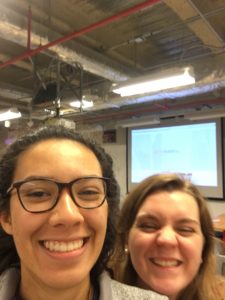
Evaluation has been hands-down my favorite part of this process. My group conducted 2 different focus groups – the second that was conducted was the official focus group that we thoroughly prepared, and the first was an impromptu focus group done by Jack. Both yielded great information, but I’ll just discuss the second one in this blog post, since it was the one I was involved in.
Since focus groups are essentially group interviews, I expected the planning of our focus group to be similar to that of the interviews we did earlier in the semester. However, this process would hold some key differences. Firstly, there were things we would need to consider for a focus group that we didn’t have to do for solo interviews, such as crafting the size of our focus group, including group dynamic material in our focus group guide, or choosing the best location to hold that number of people and would be functional for such an activity. Another key difference, although obvious, was that the content would be different for our focus group than it was for the interviews. It was interesting to notice that the process of interviewing had come full circle – first we outsourced to gather information that would help us define a problem and come up with a product. After leaving with that information, formulating problem statements, and embedding our data from the interviews into a product, we returned back to share what respondents had helped us come up with.
I truly enjoyed giving the focus group. I was very happy with how our prototype turned out. My team and I worked very hard to think of its functionality, and I spent a lot of time doing the visual parts of it. It was therefore very rewarding when people were receptive to our idea. This helped validate any doubts I might have had before. It was also helpful to get fresh eyes to look at our idea and give us criticisms.
I worried that our focus group would have a lot of awkward silences and that people would be too afraid to give us actual feedback, especially if they didn’t like the idea. However, I was proven wrong. Our respondents didn’t hesitate to hold back on features that they didn’t think were feasible or accessible, and even provided suggestions to help us in moving forward. The small group aspect helped allow everyone to get their thoughts in. There is still the possibility that some of the comments may have been influenced by groupthink, but all in all the process felt very genuine and definitely informative in improving our product. It also felt good to hear the respondents say that they would be happy to use an app like ours in their own living situations to help alleviate some of the confusion that can come with off-campus living.
Our inclusion of worksheets for each respondent to fill out was also a smart move. It allowed any final thoughts to be included, as well as anything that a respondent didn’t want to share verbally during the focus group. I think it’s important to include things like this for people who aren’t as comfortable speaking out, because they still have very valuable comments.
I also attended the last Innovation Sprint Event of the Semester, ‘Sustainability Meets Design Thinking’. As I’ve mentioned in previous posts, I love when I see processes mirrored in different contexts and time frames, and it was interesting to go through the same design thinking process in such an abbreviated time and paired with a topic that I’m passionate about. Although I had to leave early to get to work on time, I found that redoing processes that we’ve done in this class during the workshop helped me be better at doing it, and I really liked some of the ideas I came up with for including sustainability into college curriculum (the ideas of those sitting at my table were all very good as well). It was also fun to do something with my roommate! A picture of the two of us at the event is above.